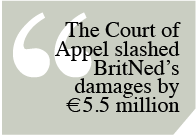How will courts handle damage claims where a cartel has been found to be operating? A recent decision gives some indications
BritNed v ABB is the first competition damages action, based on a European Commission cartel decision, to reach judgment and an award of damages in the UK. All other so-called ‘follow-on’ cartel damages cases have been settled before judgment.
As such, a recent decision from the Court of Appeal provides long-awaited clarity on how the courts will award damages in cartel claims. Broadly, the decision affirms that the principles on recovery of damages in competition cases are similar to other claims for damages under English law.
 In April 2014, the European Commission found that a number of power cable manufacturers, including ABB, had infringed European competition laws by forming a cartel involving market-sharing and customer allocation. Based on the findings of fact in the European Commission decision, BritNed brought a ‘follow-on’ damages claim in the English High Court against ABB in relation to a UK-Netherlands submarine electricity cable system BritNed had purchased from ABB during the cartel period.
In April 2014, the European Commission found that a number of power cable manufacturers, including ABB, had infringed European competition laws by forming a cartel involving market-sharing and customer allocation. Based on the findings of fact in the European Commission decision, BritNed brought a ‘follow-on’ damages claim in the English High Court against ABB in relation to a UK-Netherlands submarine electricity cable system BritNed had purchased from ABB during the cartel period.
The High Court awarded BritNed just over €13 million but this was a small fraction of the €180 million in damages BritNed had claimed. Both BritNed and ABB appealed this decision: BritNed unsurprisingly sought an increase in damages, and ABB challenged a certain proportion of the award relating to so-called ‘cartel savingså’.
Examining the damage claims
The Court of Appel slashed BritNed’s damages by €5.5 million. In so doing it clarified two key points: First, in reviewing the ‘cartel-savings’ head of damages, the Court of Appeal made clear that a claimant can only recover losses it has actually incurred and not ‘savings’ that another party may have made due to their participation in a cartel or otherwise. BritNed, the Court of Appeal found, was not entitled to the €5.5 million awarded based on ABB’s ‘cartel savings’ because it had not proven that these savings amounted to a loss it had suffered.
The Court of Appeal found that damages can only be awarded on a compensatory basis and rejected calls for a more strict and punitive approach to damages in cartel claims.
Second, the decision serves as an important reminder that the burden of proof of loss remains on the claimant, a general principle of English law. Claimants routinely claim large sums in alleged losses in competition claims, often without much analysis, assuming a cartel necessarily leads to inflated prices. BritNed’s final award of €7.5 million represents just 4% of the €180 million of damages it claimed, and highlights the stark reality that for some claimants the cost of litigation simply may not be worth the relatively small return in damages.
The Court of Appeal’s decision showed that the courts should look carefully at the facts, and may deter future claimants from bringing unmerited competition claims. It is a welcome confirmation of the rules around damages in competition litigation under English law, especially because some recent cases had begun to show a trend of claimants arguing that different standards of proof should apply in cartel cases.
The Court of Appeal’s decision serves as a reminder that breaches of competition law do not necessarily lead to an overcharge, and therefore, loss to customers.
Marc Israel, Partner, White & Case
Charles Balmain, Partner, White & Case
Ellen Campbell, Trainee, White & Case